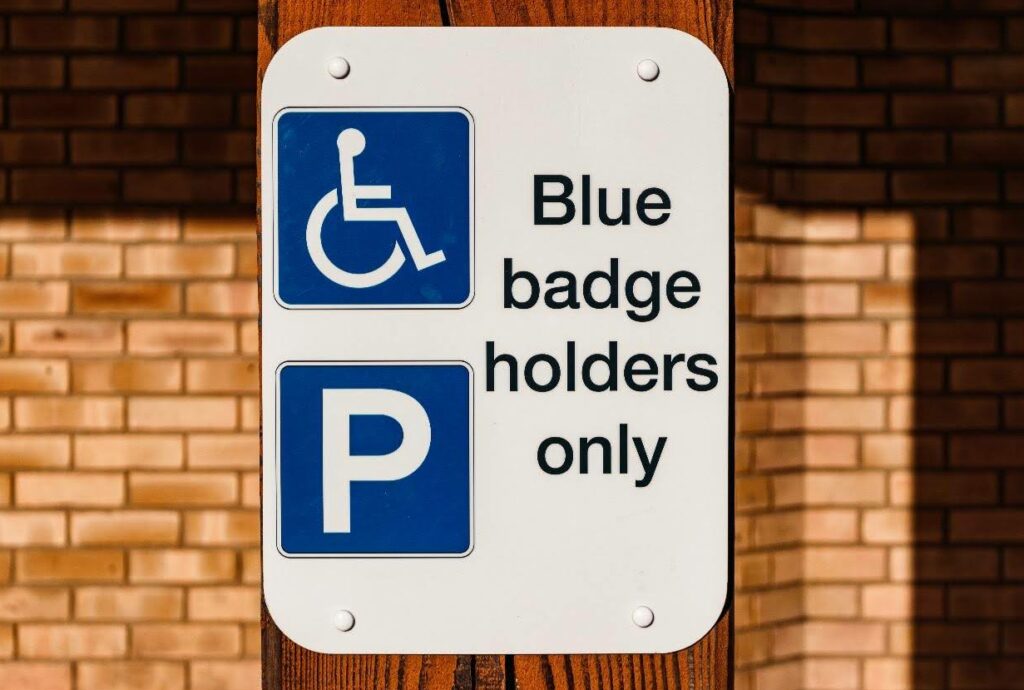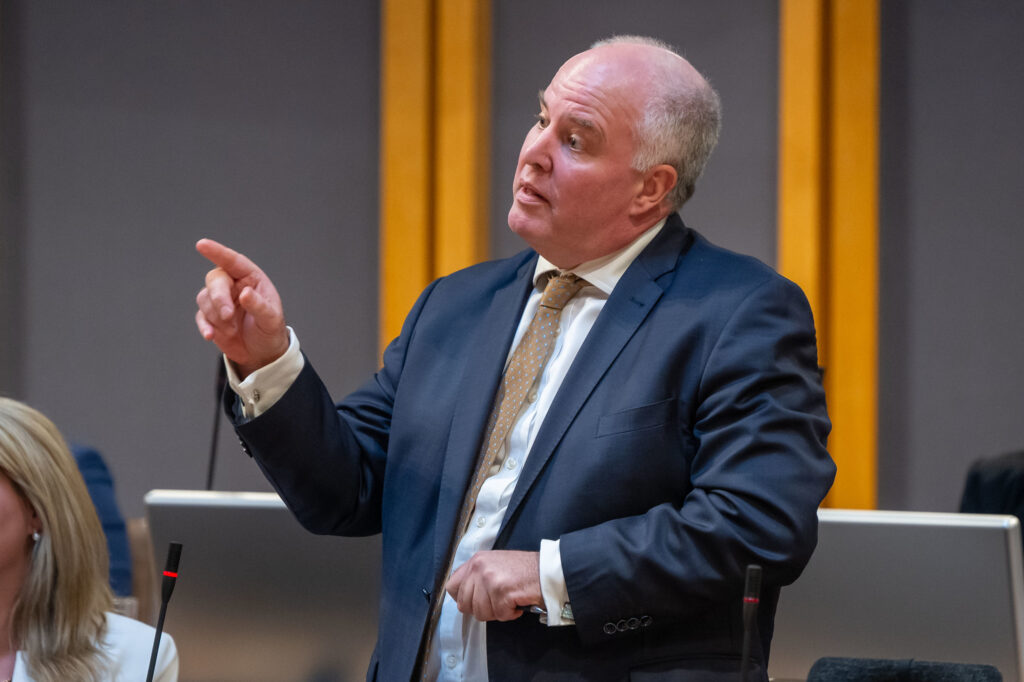Matthaus Bridge outlines the problems with the current blue badge application process and shares the stories of those affected.
A Blue Badge is a disabled parking permit that is displayed when an individual parks in a designated disabled space. The current Blue Badge system requires a disabled person, or someone on their behalf, to renew their application every three years. Blue Badges are issued by local authorities and the guidelines for eligibility are issued by Welsh Government.
Due to the three-year renewal policy, individuals and carers are faced with overlapping and confusion. Even after providing sufficient evidence of a lifelong disability, illness, or condition, it isn’t possible to obtain a permit for life. Every three years, this leads up to another time-consuming and harrowing experience of filling in application forms for people who need to access it.
An individual’s application is placed into one of three qualifications: Automatic, Discretionary, or Temporary. In theory, it should take no longer than 12 weeks for an application to be approved, according to Welsh Government; however, if an individual is refused a Blue Badge there is no legal right to appeal, meaning the applicant will have to re-apply.
Applications can be completed online or by requesting a form from your local authority. The application form includes a range of questions, including a description of how their illness, disability or mental health affects them day to day, and the type of medication they take.
Stand North Wales CIC, a non-profit community interest company that represents families and young children with additional needs and disabilities, has created a petition calling for lifelong Blue Badge applications for individuals with lifelong diagnoses.
Our research has highlighted inconsistencies, lack of understanding and stress affecting the livelihoods of disabled individuals and family members who are caring for their loved ones across Wales.
We spoke to individuals and carers at Stand North Wales CIC and to Lauren Kearney, a midwife from Newport who suffers from rheumatoid arthritis, as they shared their experiences of the Blue Badge application process. We also spoke to Miranda Evans, Policy and Programmes manager at Disability Cymru.
‘It takes months’
Louise’s* 15-year-old son is non-verbal, has learning disabilities and has an autism spectrum disorder (ASD). Although she has successfully acquired a Blue Badge for her son, the application process caused her and her family much distress: ‘It takes months of sitting there and looking at these forms and having to write the worst things about your child who is wonderful to you,’ she says. ‘Having to keep repeatedly telling a stranger who has no medical knowledge just tears you apart. My son’s condition will only get worse, so we shouldn’t have to do these things periodically.’
The language and wording of the application match ableist attitudes within society, according to Stand North Wales. Equipment such as wheelchairs and zimmer frames are labelled in a restrictive manner, says Julie*, another parent: ‘It’s not disabled equipment, it’s enabling. They enable us to try and be a functioning member of the community. These forms just knock us back all the time.’
Lauren Kearney’s first application for a Blue Badge was turned down by Torfaen Council. The stress resulting from her rejection and the application process caused her condition to worsen and even led to her experiencing flare-ups; worse still, the council rejection made her question her disability. ‘It makes you think “Oh if the council thinks I’m not eligible, then perhaps it’s all in my head”,’ she explains. ‘It’s definitely not, but having a councillor tell you that you’re “not disabled enough for a blue badge” is awful.’
‘It takes months of sitting there and looking at these forms and having to write the worst things about your child who is wonderful to you.’
After rigorously fighting her cause, Lauren eventually acquired her Blue Badge; however, her situation speaks to prevailing systemic issues in the treatment of disabled people, and to the hardships and additional emotional labour they remain subject to.
In addition, the process itself is a heartbreaking experience, says Julie Meese, Community, Engagement and Participation Officer at Stand North Wales. It focuses on what individuals can’t do, rather than what they can do.
We reached out to Torfaen Council, who stated: ‘There is a strict eligibility criteria for Blue Badges which is set out in legislation and we follow Welsh Government guidance when processing applications. We welcome and value customer feedback and use this insight to review and improve the services we offer where possible.’
Discussions and debates that drive Wales forward.
Join Wales’ leading independent think tank.
A lack of understanding
This is not a new issue. Back in 2019, answering a consultation on Blue Badges led by Senedd’s Equality, Local Government and Communities Committee, Miranda Evans, Policy and Programmes manager at Disability Cymru, said: ‘There are inconsistencies in the knowledge of the assessors to understand how certain disabilities affect a person’s day-to-day living. Also, there needs to be an element of empathy in the application system to understand the importance and the need for a Blue Badge.’
According to Sally*, who cares for her two daughters who have Down syndrome, local authorities have yet to implement the suggestions made by Evans several years ago: ‘The individuals who administer the Blue Badge don’t understand our life. They don’t understand the difference having that badge makes. Without it, I wouldn’t be able to go to the supermarket with my girls. It feels like the system is stopping people, not helping them.’
If a person does not automatically qualify for a Blue Badge, then a mobility assessment may be carried out by an Independent Mobility Assessor. According to Welsh Government, these assessments are ‘usually’ carried out by a medical trained professional. Naomi* is a wheelchair user and cares for her two children, who have complex needs. The last assessor to visit her had no knowledge or understanding of her disability, she adds: ‘When I tried to apply for a Blue Badge for one of my sons I was told “It doesn’t matter because you have one”.’
The lack of understanding Naomi experienced shows that this issue is not limited to a single local authority or assessor, and is only one example of the lack of understanding carers and people living with a disability have to face frequently.
Welsh Government guidance states that a person does not have to drive to apply for a Blue Badge, and that it can be used for any car when that person is a passenger. This causes great difficulty for individuals like Naomi who can’t get a Blue Badge for her son, meaning every time her son requires a disabled space, Naomi must be in the car with him, which leaves no respite for her.
‘A Blue Badge is not a luxury item; it’s an essential aid to independent living for disabled people who require close, easy access to buildings, due to their impairment. Impairments and health conditions are not always visible either. People must understand this better. There is far too much judgement placed on whether someone looks disabled or not. People have to go through a not-so-easy process and assessment to obtain a Blue Badge and then they have to endure public judgement afterwards. We need a public awareness campaign to educate people,’ says Miranda Evans, Policy and Programmes manager at Disability Cymru.
‘The council wouldn’t believe a consultant’s letter, a letter from my GP or information from my rheumatologist. Also, every document said my condition is a lifelong condition.’
Confusion and Questioning
There are two sources of benefits that individuals with a disability, illness or mental health issue can apply for: Disability Living Allowance (DLA) is a benefit for individuals under the age of 16 and is designed to help with mobility and care costs; the Personal Independence Payment (PIP) is an additional benefit to help individuals over the age of 16 with an illness, disability, or mental illness. The PIP uses a points system which then determines the amount an individual is entitled to. People who score eight or more points in the ‘Moving Around’ activity of PIP are automatically eligible for a Blue Badge.
Although both benefit and Blue Badge applications are separate, whether or not a person is in receipt of PIP or DLA is considered when applying for a Blue Badge. Individuals who do not claim PIP need to fill in an additional form explaining why they need the badge.
Lauren was told that, because she didn’t claim PIP, she was not eligible for a Blue Badge. Under Welsh Government guidelines, Lauren falls under discretionary qualification, meaning Blue Badge applicants who do not claim additional benefit such as PIP or DLA; however, even after providing sufficient evidence of her disability to her local authority, her first application was rejected: ‘The council wouldn’t believe a consultant’s letter, a letter from my GP or information from my rheumatologist. Also, every document said my condition is a lifelong condition.’
Hidden Disabilities
Regardless of a person’s condition, individuals constantly need to prove their disability during the application process. This is especially difficult for people with hidden or dynamic disabilities. Unfortunately, this isn’t just a government matter, but a social one.
Tom* cares for his wife, who suffers with long-COVID, and his son, who is autistic. Both have acquired their Blue Badges and it has made a huge difference to their lives. With that being said, he believes we should do away with the traditional disabled parking signs and opt for a more inclusive representation of all disabilities: ‘The looks, comments and digs that we get when getting in and out of the car when we park in a disabled space is dreadful, and it must be soul-destroying for others with a hidden disability.’
Positive changes have been made by local authorities in the UK to address this issue. This year, Sam Vestey, a student who has a chromosomal condition called DiGeorge Syndrome and survived a pineoblastoma (a high-grade cancerous brain tumour) as a child, made a major breakthrough in his hometown, Cheltenham. He successfully campaigned for an alternative disabled sign that shows one person in a wheelchair and two able-bodied people which reads: ‘Some disabilities are visible. Some are not. Take care of each other.’ He told South Wales Guardian: ‘Just because people can’t see my disability, they don’t understand how much pain I am in and how fatigued I get.’
Overall, it’s a burning issue that needs further discussion and adapting because it’s clear that disabled access is a necessity and there are inconsistencies and confusion with the current system. The difficulty of obtaining a Blue Badge has created an environment where disabled individuals feel lucky to have their Blue Badge. As Sally perfectly sums up: ‘We shouldn’t be saying “I’m lucky to have a Blue Badge”. Why should we be lucky? We need it.’
You can find the petition started by Stand North Wales CIC here.
All the names of parents and carers have been removed to protect their anonymity, with the exception of Lauren Kearney and Sam Vestey.
All articles published on the welsh agenda are subject to IWA’s disclaimer. If you want to support our work tackling Wales’ key challenges, consider becoming a member.





